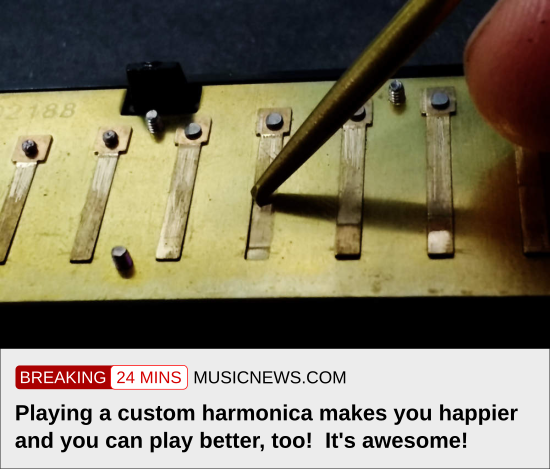
Will a custom harmonica help students make progress faster?
Some would say that a custom harp should be reserved for experienced players who have learned breath control. I disagree. I think it's easier to learn breath control from the very start. Playing with too much force is a bad habit and it can be hard to correct these behaviours.
A custom harmonica is extremely responsive and allows you to focus on fine motor control. It's also more fun to play which can lead to a better outlook and more hours spent practising.
Will a custom harmonica make you a better player?
Some pro players use custom harmonicas, some don't. Many professional players can make music on any harp - no matter how bad it is.
But will they play each harp exactly the same? Will they play the same riffs? Will they take as many risks? I'm sure they can find a way to express a feeling no matter what instrument they've got because they've put in the years of practice.
A stock harp has the notes, it's just harder to play them. I think it's easier to play a cheap harp once you have developed fine motor control using a responsive harp like a custom harmonica. An unresponsive harp just needs more force.
I believe the opposite is harder - It's a greater challenge to develop fine control if you start off with lots of force.
We need an evidence-based study to shed light on these questions.
Some would say that it will always be a subjective experience and therefore the question can never be answered (all answers are correct.)
It is possible to get an objective assessment of something subjective. Take pain for example. You cannot tell exactly what someone's pain feels like but you can objectively compare treatments and rate how pain scores change. This is what inspired 'the assessment': https://harp.andrewzajac.ca/TheAssessment
As for an objective study, I've started the conversation with a few instructors. It would require a lot of work over several years.
My idea so far is as follows:
- recruit several top instructors to have their students enter the study.
- all levels of progress would be welcome but I think the least experienced students would provide the best data because they would have developed fewer bad habits.
- each student will receive two harps from me. On the outside, they will be identical. One will be defect-free stock and the second will be high-performance (custom). Which harp is which will be randomised. The student's won't know nor will the instructors. (Randomised, double-blind.)
- each student is given a schedule to use a particular harp exclusively for study and practice that week. The schedule will give equal time to both harps over a period of a few months.
- after each lesson, both the student and the teacher complete an evaluation. Questions are about objective (teacher evaluated) progress (did they achieve the lesson goal? ) , subjective (student evaluated) progress (how do you think you did?) How may hours did you practice this week, how fun was practising this week, etc...
Possible outcomes to look for are:
- do students make better progress with custom or stock harps?
- do they put in more hours when using one harp over the other
- do they have more fun?
- can the evaluator guess which harp they are playing without asking or getting any hints?
- which type of harp has a greater propensity for blowing out a reed?
- etc...
I think we would need to gather data from 50-100 students being followed over a few months of lessons to reach significance.
I estimate I would be able to provide both harps for CAD $200.00 which is slightly more that the retail price of two performance level instruments.
Possible weaknesses include:
- Bias from instructors evaluating their own students.
I feel that this would be controlled because both the student and teacher are blinded to the type of harp. It would be ideal to have an independent evaluator measure progress, but this would be complicated and I fear compliance rates would be low due to the extra time and effort required after each lesson. Using the instructors for evaluation would be straightforward since it's something that could be done in the final minute of each lesson.
- Different instructors would have different criteria, lesson plans and teaching styles and therefore absolute progress would not be expected to be the same between instructors.
I feel that this would be controlled because we could measure relative improvement instead of absolute improvement.
- The expense of the instruments and lessons may correlate with the level of interest or emotional investment of the student. If instructors charge different rates for lessons, this introduces another variable that can have an impact on outcomes.
2019-12-15
Contact me if you have any suggestions or questions about this idea. I'd love to hear from you.